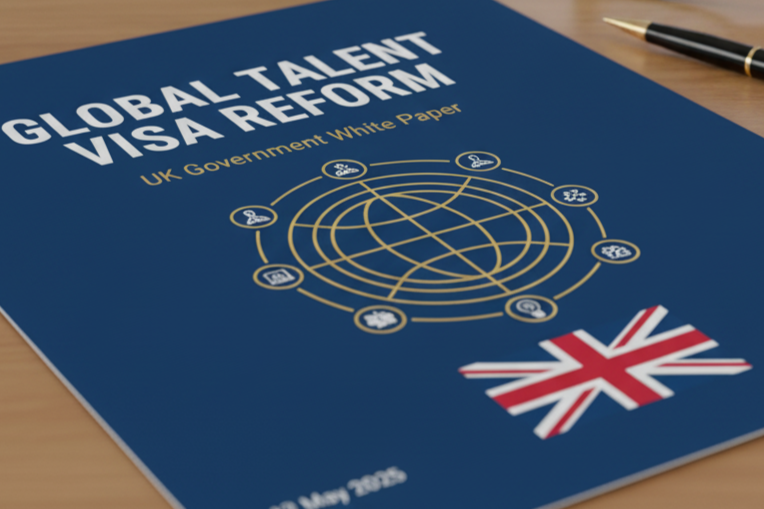Global Talent Visa 2025: What the UK Immigration White Paper Means for You
Key changes for Global Talent visa holders & dependants, settlement route and English language requirements
The UK has published its far-reaching immigration reform white paper — Restoring Control over the Immigration System. While the white paper covers a wide range of routes, one of the most significant angles is how it treats the high-talent categories — including the Global Talent visa. For those applying for, or already holding, the Global Talent route, this blog drills into:
The proposed changes for the Global Talent visa
The impact for dependants of Global Talent visa holders
What the white paper says about settlement/ILR and English-language tests for this category
What is known and what remains unclear
Practical steps you should consider now
What is the Global Talent visa?
The Global Talent visa allows recognised leaders or emerging leaders in academia, research, arts & culture or digital technology to live and work in the UK without a job offer, provided they secure an endorsement. It’s a premium route for highly skilled talent.
Key changes for the Global Talent visa under the white paper
Here are the main reforms proposed in the white paper which affect the Global Talent visa:
1. Streamlining and expansion of the route
The white paper emphasises that the Global Talent visa route will become simpler and easier for top scientific, research, design, tech and cultural talent to use.
Examples include:
Increasing places and entry points for very highly skilled applicants.
Reviewing the related Innovator / Founder visa to support entrepreneurial talent transitioning from UK study into business.
2. Integration and skill-focus approach
The white paper positions high-talent routes like Global Talent as part of the UK’s strategy to attract strategic skills and boost growth. This suggests that while access is to be improved for the top end, other reforms (eg. settlement and language) may also apply.
3. Dependants and English-language rules
While much commentary focuses on Skilled Worker categories, the white paper extends new requirements to dependants of work and student visa holders — which by its logic and cross-route treatment could affect Global Talent dependants too. It states a new English-language requirement for all adult dependants at level A1 initially, progressing to A2 for extensions and B2 for settlement.
Also the white paper reiterates integration as a core pillar.
4. Settlement (Indefinite Leave to Remain) changes
On settlement, the white paper proposes that for Points-Based System routes (which include Global Talent), the standard qualifying period may increase from five years to ten years unless earlier settlement is granted based on contribution.
Although this is more widely discussed for Skilled Worker routes, it is flagged for other work routes too.
Settlement / ILR: How will these changes apply to current Global Talent visa holders?
Here’s what we know and what remains unclear:
✅ What we know
The white paper proposes increasing the standard qualifying period for settlement from five to ten years for Points-Based System routes.
It also states that some migrants may qualify for earlier settlement (“earned settlement”) based on strong economic/societal contribution.
⚠️ What remains uncertain
Whether the new ten-year rule will apply to current Global Talent visa holders is not explicitly clarified in the white paper.
Which dependants are covered and whether their settlement path remains unchanged is also unclear.
What the criteria for “earned settlement” will be (how early settlement might still be available) are yet to be defined.
🔍 What this means practically
If you are already on a Global Talent visa, you should assume the current five-year settlement pathway remains in force for now, but you should monitor rule changes because the government reserves the right to apply the new rules to fresh applications (and possibly to those switching status) once regulations are laid.
If you are planning to apply for settlement later, or you sponsor a dependant, it is wise to prepare for the possibility of a longer qualifying period and to understand the contribution criteria.
English language requirements: What applies to Global Talent route now (and in the future)
✅ What we know
The white paper states that English-language requirements will be raised for dependants of workers and students (level A1 initial, A2 extension, B2 settlement) and that English levels for work routes may also increase.
For the Global Talent visa route, currently neither the main applicant nor the dependants are required to meet the English-language test.
⚠️ What remains unclear
Exactly whether the English-language requirement will be retrospectively applied to existing Global Talent visa holders or just new applicants.
The date when the new requirement will come into force (for this route) is not specified in the white paper.
Whether there will be any exemptions or transitional protections for dependants.
🛠 Practical advice
If you are a Global Talent visa holder or dependants:
Check your current visa conditions and whether you were required to meet an English test originally.
Keep updated on Home Office/Immigration Rule announcements for when the new English-language regime takes effect for Global Talent dependants.
For future applications or extensions, assume that English test requirements may be introduced and prepare accordingly.
Conclusion
The UK’s 2025 immigration white paper marks a significant shift — for many routes and categories — including the Global Talent visa. While the route is being strengthened and streamlined for top talent, it is also being framed within a system that increasingly emphasises integration, contribution and longer paths to settlement.
For Global Talent visa holders and their dependants, the journey remains promising, but new rules (for settlement, dependants and English-language requirements) could introduce additional steps and timelines.
At YourFutureVisa.net, we specialise in interpreting these complex frameworks into clear, actionable guidance — ensuring your Global Talent application not only qualifies but stands out.

